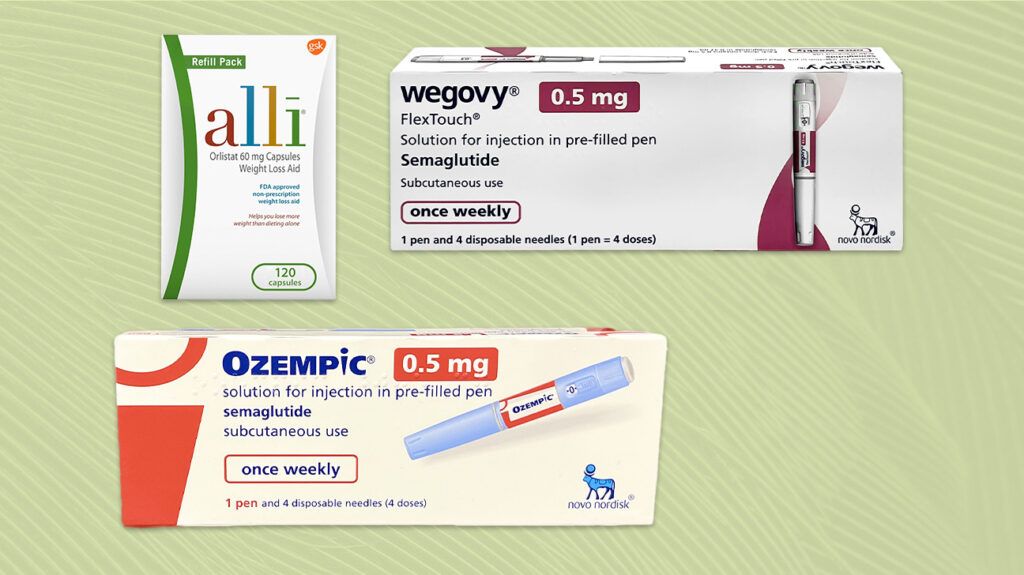Weight loss medications are available over-the-counter (OTC) and on prescription for eligible people. Most of these medications work by reducing appetite.

According to the
Prescription weight loss medication has become extremely popular because it is easy to take and effective. But, it is expensive, and people must also try to lose weight with diet and exercise while taking the drug.
Prescription and OTC weight loss medications are available, but only one nonprescription medication has Food and Drug Administration (FDA) approval.
This article discusses what weight loss medication is, how it works, and whether it is safe. It also lists the available medications, alternatives, and when to contact a doctor.
Weight loss medications typically suppress a person’s appetite.
GLP-1 medications are one type of weight loss medication. It is not completely clear how they work. However, studies have shown that these drugs help suppress hunger and manage appetite.
Research from 2021 states these medications can help with weight loss by decreasing energy intake and increasing energy expenditure.
Anorectics are another type of weight loss medication. Further 2021 research states that these suppress appetite, minimize fat absorption, and increase the feeling of fullness.
Doctors may not prescribe weight loss medication to everyone. Plus, although GLP-1 drugs are effective for weight loss, not all of them have FDA approval for weight loss. In these cases, doctors can prescribe them off-label for weight loss.
Typically, the eligibility criteria for GLP-1 medication are:
- a body mass index (BMI) score of 30 or over
- a BMI of 27 or over and a weight-related health condition
The weight-related health conditions can include those such as diabetes, high cholesterol, or high blood pressure.
People can get prescription weight loss drugs with an in-person visit to a healthcare professional or through telehealth services. Telehealth may appeal to people who are in more rural locations, do not have a primary care doctor, or find it difficult to make an appointment at a local clinic.
Alli is the only OTC weight loss medication with
The following comparison table features the prescription and OTC medications in this article.
All prescription medication prices come from Optum Perks, an online prescription search engine. Optum Perks provides coupons that may lower the cost of medication.
All prices are current as of December 2024. The price of each medication is for a 4-week supply of the lowest possible dose.
| Prescription needed? | Price | Frequency of dosage | Covered by insurance? | Our recommended retailer | |
|---|---|---|---|---|---|
| Wegovy | yes | $1,300 to $1,400 | once weekly injection | yes | Ro Body |
| Ozempic | yes | $3,800 to $3,900 | once weekly injection | yes | Calibrate |
| Saxenda | yes | $7,900 to $8,300 | once daily injection | yes | K Health |
| Mounjaro | yes | $1,000 to $1,100 | once weekly injection | no | PlushCare |
| Adipex-P | yes | $4.49 to $15.58 | one tablet daily | no | Optum Perks |
| Contrave | yes | $311 to $342 | two tablets daily | yes | PlushCare |
| Orlistat | yes | $647 to $706 | three capsules daily | yes | PlushCare |
| Alli | no | $50 to $73 | three capsules daily | yes | Walmart |
Medical News Today only chooses telehealth services and online pharmacies that pass our rigorous vetting process to make sure our readers have a safe healthcare experience. We consider:
- Safety: We only include telehealth services that have a healthcare professional available to determine whether the medication is safe and appropriate for use. Online pharmacies must only dispense medication with a valid prescription.
- Weight loss medication options: We only feature FDA-approved weight loss medications. Plus, as there are occasionally shortages of GLP-1 and other weight loss medications, we only include telehealth services that also offer alternative medication if necessary.
- Membership options: Telehealth services often have membership options that can reduce the cost of care. While most memberships do not cover the cost of medication, they can make receiving care and lifestyle support significantly less expensive.
- Insurance concierges: We include telehealth companies that offer insurance concierge services, removing some of the uncertainty and stress people may feel while waiting to know if insurance will cover the cost of medication.
Some weight loss medications are available via prescription, while others are OTC options. Glucagon-like peptide agonists (GLP-1) and anorectics are two types of weight loss medications. Both work by helping suppress appetite.
Prescription weight loss medications are available as injections or capsules. GLP-1 medications are currently the most popular prescription weight loss medication.
It is not yet clear how these medications work, but studies have found that GLP-1 medications can help suppress appetite by slowing the time it takes to empty the stomach, leaving a person feeling full for longer.
Prescription medication for weight loss typically comes with lifestyle change support, either from the healthcare professional writing the prescription or from third-party referrals.
If a person uses an online service to buy weight loss medication, lifestyle support may be included in the cost of using that service.
A person may decide to try an OTC weight loss medication rather than a prescription option because of the cost.
It may also be quicker to buy medication OTC rather than wait to visit a doctor. A healthcare professional visit can involve having tests before receiving a prescription of medication for delivery or pickup from a pharmacy.
However, the FDA currently
No other weight loss capsules have FDA approval. They may either not be effective or could be dangerous to consume. Again, people should consult a doctor before trying these.
All prescription weight loss medication has approval from the FDA and is typically safe to take.
According to a 2018 study, there were no safety concerns for semaglutide prescription medication treatments for weight loss. Semaglutide medications include Wegovy and Ozempic.
Additionally, 2022 research found that tirzepatide medications, such as Mounjaro, were safe. However, this type of medication did cause side effects, including dizziness, nausea, diarrhea, and other gastrointestinal issues.
There are many ways a person can try to lose weight without the need for weight loss medication.
The
- following a balanced eating plan and reducing calorie intake
- getting regular physical activity
- setting weight goals
- asking for support from family, friends, and healthcare professionals
- enrolling in a weight loss program
If a person wishes to lose a large amount of weight, they should consult a healthcare professional first.
Additionally, if someone has difficulty losing weight after trying nonmedical techniques, they should talk with a doctor who may prescribe weight loss medication.
Alternatively, a doctor may recommend bariatric surgery or weight loss devices. Examples of weight loss devices include:
- electrical stimulation system
- gastric balloon system
- gastric emptying system
A person should contact a medical professional if they experience any side effects when taking weight loss medication.
Want to buy GLP-1 medication from vetted and trusted telehealth services? Read our in-depth reviews:
- How to Get Wegovy in 2024: In-Person and Online
- Wegovy Prescription Online: How to Get One and Where to Buy
- How to Get Ozempic
- Where to Buy Ozempic Online: Trusted Options and Places to Avoid
- Ozempic Alternatives: Safe Options and Where to Buy in 2024
- How to Get Mounjaro (Tirzepatide) and What to Know in 2024
- How to Get Zepbound (Tirzepatide) in 2024
Prescription medications with FDA approval are the safest options for weight loss. However, the most effective medication will differ between individuals. People should work with a qualified healthcare professional to determine the best weight loss plan for their goals and overall health.
A person can ask a doctor for weight loss medication. A doctor can prescribe them if the person has a BMI of 30 or over or a BMI of 27 or over and a weight-related health condition, such as high blood pressure or diabetes.
If a person does not meet the criteria for a weight loss medication prescription, insurance may not cover the drugs, and a doctor can suggest alternative ways to lose weight.
A person should use weight loss medications alongside diet management and exercise. Working with a healthcare professional to help meet an individual’s weight loss goals is preferable.
According to the Obesity Medicine Association, phentermine is the most commonly used weight loss drug. Originally used as a short-term therapy to kick-start weight loss, it is the oldest weight loss medication.
GLP-1 medications have become more popular over the last couple of years. This has led to recurrent shortages of many GLP-1 drugs due to an increase in demand. A healthcare professional may prescribe a different medication if a GLP-1 drug is not available.
No researchers have directly compared Ozempic and Wegovy. However, a 2022 review of 23 studies suggests that Wegovy may result in greater weight loss than Ozempic.
It is worth noting that doctors usually prescribe a higher ongoing maintenance dose of Wegovy than Ozempic. This could explain the review’s findings.
Doctors can prescribe the popular weight loss drugs Ozempic, Wegovy, and Mounjaro, among others, for weight loss.
Prescription weight loss medication is available for some people. Some medications suppress appetite, while others decrease fat absorption.
Some OTC medications are also available. However, only one nonprescription medication has approval from the FDA. A person should consult a healthcare professional before taking any weight loss medication.


